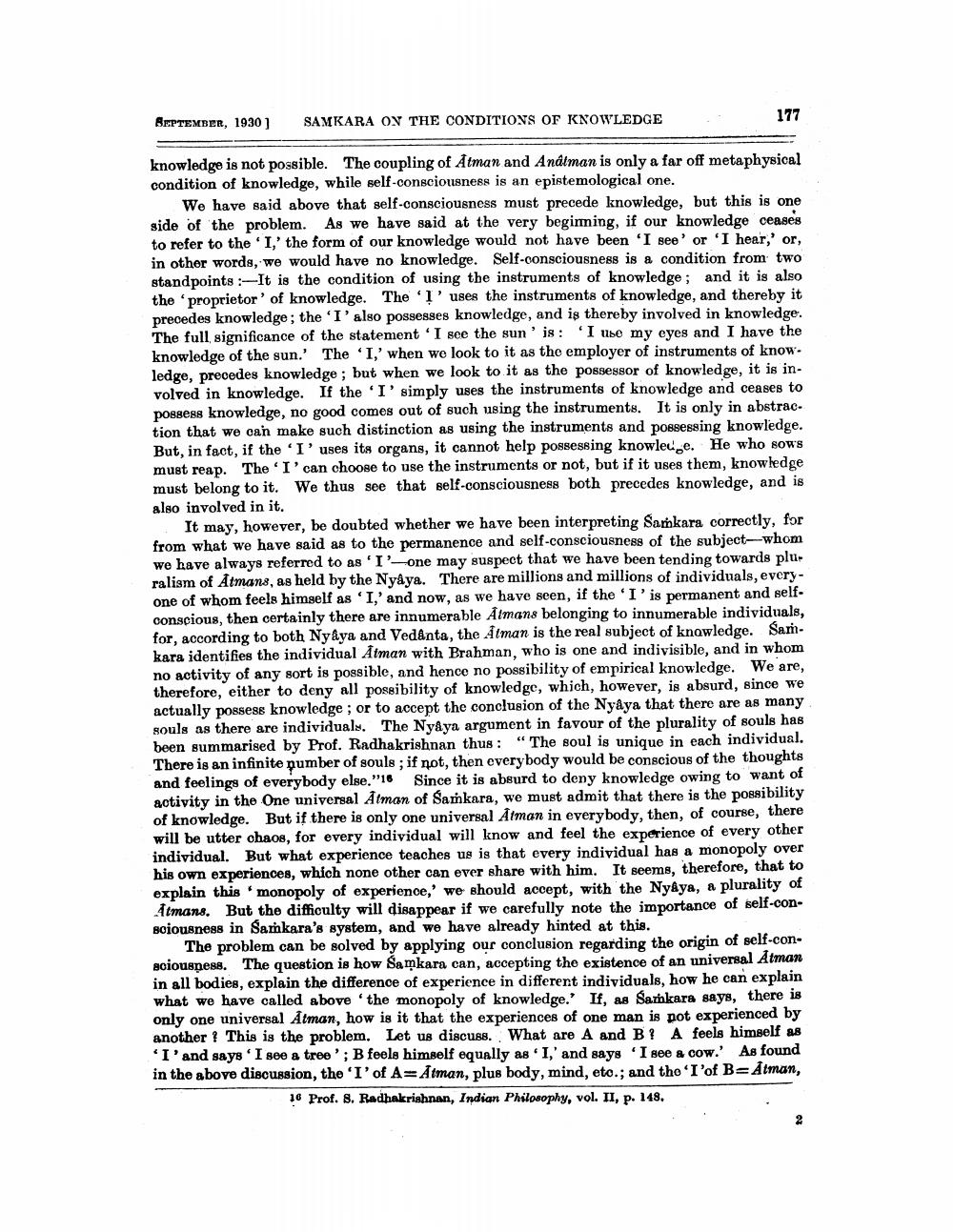________________
BEPTEMBER, 1930)
SAMKARA ON THE CONDITIONS OF KNOWLEDGE
177
knowledge is not possible. The coupling of Atman and Andlman is only a far off metaphysical condition of knowledge, while self-consciousness is an epistemological one.
We have said above that self-consciousness must precede knowledge, but this is one side of the problem. As we have said at the very beginning, if our knowledge ceases to refer to the 'I,' the form of our knowledge would not have been 'I see' or 'I hear,' or, in other words, we would have no knowledge. Self-consciousness is a condition from two standpoints :-It is the condition of using the instruments of knowledge; and it is also the proprietor' of knowledge. The 'I' uses the instruments of knowledge, and thereby it precedes knowledge; the 'I' also possesses knowledge, and is thereby involved in knowledge. The full significance of the statement 'I see the sun is: 'I be my eyes and I have the knowledge of the sun.' The 'I,' when we look to it as the employer of instruments of know. ledge, precedes knowledge ; but when we look to it as the possessor of knowledge, it is involved in knowledge. If the 'I' simply uses the instruments of knowledge and ceases to possess knowledge, no good comes out of such using the instruments. It is only in abstraction that we can make such distinction as using the instruments and possessing knowledge. But, in fact, if the 'I' uses its organs, it cannot help possessing knowleuce. He who sows must reap. The 'I'can choose to use the instruments or not, but if it uses them, knowledge must belong to it. We thus see that self-consciousness both precedes knowledge, and is also involved in it.
It may, however, be doubted whether we have been interpreting Samkara correctly, for from what we have said as to the permanence and self-consciousness of the subject--whom we have always referred to as I'one may suspect that we have been tending towards pluralism of Atmans, as held by the Nyâya. There are millions and millions of individuals, everyone of whom feels himself as 'I,' and now, as we have seen, if the 'I' is permanent and selfconscious, then certainly there are innumerable Atmans belonging to innumerable individuals, for, according to both Nyâya and Vedanta, the Atman is the real subject of knowledge. Samkara identifies the individual Ātman with Brahman, who is one and indivisible, and in whom no activity of any sort is possible, and hence no possibility of empirical knowledge. We are, therefore, either to deny all possibility of knowledge, which, however, is absurd, since we actually possess knowledge, or to accept the conclusion of the Nyâya that there are as many souls as there are individuals. The Nyaya argument in favour of the plurality of souls has been summarised by Prof. Radhakrishnan thus: “The soul is unique in each individual. There is an infinite pumber of souls; if not, then everybody would be conscious of the thoughts and feelings of everybody else."16 Since it is absurd to deny knowledge owing to want of activity in the One universal Atman of Samkara, we must admit that there is the possibility of knowledge. But if there is only one universal Alman in everybody, then, of course, there will be utter chaos, for every individual will know and feel the experience of every other individual. But what experience teaches us is that every individual has a monopoly over his own experiences, which none other can ever share with him. It seems, therefore, that to explain this monopoly of experience,' we should accept, with the Nyâya, a plurality of
Atmans. But the difficulty will disappear if we carefully note the importance of self-consciousness in Samkara's system, and we have already hinted at this.
The problem can be solved by applying our conclusion regarding the origin of self-consciousness. The question is how Samkara can, accepting the existence of an universal Atman in all bodies, explain the difference of experience in different individuals, how he can explain what we have called above the monopoly of knowledge.' If, as Sankara says, there is only one universal Atman, how is it that the experiences of one man is pot experienced by another ! This is the problem. Let us discuss. What are A and B ? A feels himself 98
I'and says I see a tree'; B feels himself equally as I,' and says I see a cow. As found in the above discussion, the 'T' of A=Atman, plus body, mind, eto.; and the ‘T'of B= Ātman,
10 Prof. 8. Radhakrishnan, Indian Philosophy, vol. II, p. 148.




